Hold (compartment)
A ship's hold or cargo hold is a space for carrying cargo in the ship's compartment.

Description
Cargo in holds may be either packaged in crates, bales, etc., or unpackaged (bulk cargo). Access to holds is by a large hatch at the top. Ships have had holds for centuries; an alternative way to carry cargo is in standardized shipping containers, which may be loaded into appropriate holds or carried on deck.[1][2]
Holds in older ships were below the orlop deck, the lower part of the interior of a ship's hull, especially when considered as storage space, as for cargo. In later merchant vessels it extended up through the decks to the underside of the weather deck.
Some ships have built in cranes and can load and unload their own cargo. Other ships must have dock side cranes or gantry cranes to load and unload.[3]
Cargo hatch

A cargo hatch or deck hatch or hatchway is type of door used on ships and boats to cover the opening to the cargo hold or other lower part of the ship. To make the cargo hold waterproof, most cargo holds have cargo hatch. This can be a waterproof door, like a trap door with hinges or a cover that is places on top of the cargo hold opening, covered and held down with a tarp or a latching system. Cargo hatch can also be flexible and roll up on to a pole. A small cargo hatch to a small storage locker is called a Lazarette. Should a cargo hatch fail in a storm, the ship is at risk of sinking, such that has happened on bulk carrier hatches. Some ships that sank due to cargo hatch failure: MV Derbyshire, MV Christinaki, Bark Marques, SS Henry Steinbrenner, SS El Faro, SS Marine Electric, and the SS Edmund Fitzgerald. Most cargo hatches have a coaming, a raised edge around the hatch, to help keep out water. The term batten down the hatches is used prepare the ship for bad weather. This may included securing cargo hatch covers with wooden battens, to prevent water from entering from any angle. The term cargo hatch can also be a used for any deck opening leading to the cargo holds. Aircraft and spacecraft may also used the term for its cargo doors.[4]
- Basic types:
- Lifting (up to remove)
- Rolling (rolls up on to a pole, trap type)
- Folding (fold up like paper or an accordion
- Sliding (slides on to the deck or over the side of ship)
- Roll stowing (roll up on to a pole, plates)
Gallery
 A weathered cargo hatch cover on the SS Stevens
A weathered cargo hatch cover on the SS Stevens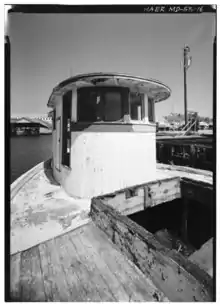 Cargo hatch coaming (bottom right) on a bugeye
Cargo hatch coaming (bottom right) on a bugeye_Cargo_hatch_at_Port_of_Nagoya_20150530.JPG.webp) Cargo hatch of the ship Port of Nagoya
Cargo hatch of the ship Port of Nagoya A sliding Cargo hatch cover on the OBO-carrier Maya
A sliding Cargo hatch cover on the OBO-carrier Maya The cargo holds of a container ship
The cargo holds of a container ship.jpg.webp) Deck hatch of the Omega, the last square-rigged sailing cargo ship
Deck hatch of the Omega, the last square-rigged sailing cargo ship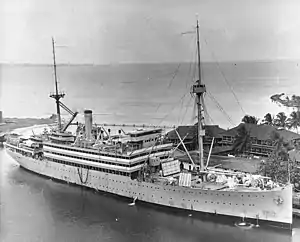 USS Henderson (AP-1) at Panama Canal in 1933. With two open cargo hatches forward of the bridge.
USS Henderson (AP-1) at Panama Canal in 1933. With two open cargo hatches forward of the bridge.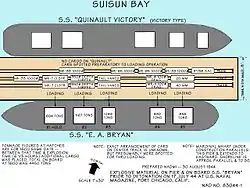 Layout from above of the five cargo holds of a Liberty ship and a Victory ship from Port Chicago disaster.
Layout from above of the five cargo holds of a Liberty ship and a Victory ship from Port Chicago disaster.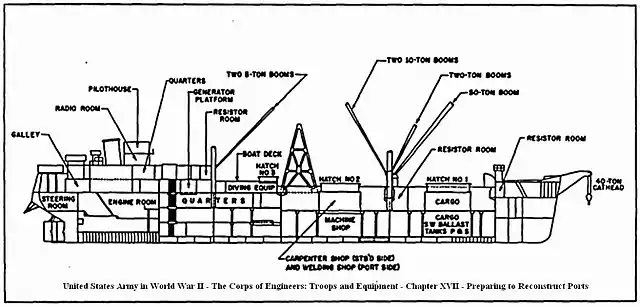 Holds of U.S. Army Engineer Port Repair ship
Holds of U.S. Army Engineer Port Repair ship The cargo hold of USS Rankin (AKA-103) for combat loading
The cargo hold of USS Rankin (AKA-103) for combat loading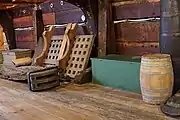 Wood cargo hold on the SS Charles W. Morgan at Mystic Seaport
Wood cargo hold on the SS Charles W. Morgan at Mystic Seaport Loading scrap iron in to a cargo hold with sliding covers
Loading scrap iron in to a cargo hold with sliding covers.jpg.webp) Positioning wool bales in a hold in 1933 into the Magdalene Vinnen (1921)
Positioning wool bales in a hold in 1933 into the Magdalene Vinnen (1921) The sliding hatch covers of Zaira.
The sliding hatch covers of Zaira. Bulk carrier hold midship cross section view
Bulk carrier hold midship cross section view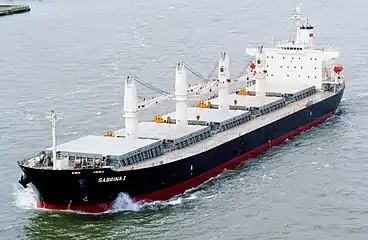 Sabrina I with five large holds
Sabrina I with five large holds Cargo hold
Cargo hold A lazarette with a white cargo hatch cover
A lazarette with a white cargo hatch cover
See also
Ships with holds:
References
Citations
- The ship cargo hold and the types of bulk cargoes Archived 2017-02-23 at the Wayback Machine
- Cargo ship: general structure, equipment and arrangement Archived 2017-01-09 at the Wayback Machine
- Cargo hold tour, SS Lane Archived 2016-08-02 at the Wayback Machine
- marineinsight.com Different Types and Designs of Hatch Covers Used for Ships, by Tanumoy Sinha, January 8, 2021
General and cited sources
- Sawyer, L. A. and W. H. Mitchell. Victory ships and tankers: The history of the 'Victory' type cargo ships and of the tankers built in the United States of America during World War II, Cornell Maritime Press, 1974, 0-87033-182-5.
- Victory Ships built by the U.S. Maritime Commission during World War II—United States Maritime Commission
- Oregon Shipyards Record Breakers Page 2: Victory Cargo Ships—World War II U.S. Navy Armed Guard and World War II U.S. Merchant Marine
External links
- SS Jeremiah O'Brien, Liberty museum ship moored at Fisherman's Wharf, San Francisco, California
- Liberty Ships built by the United States Maritime Commission in World War II
- Liberty Ships and Victory Ships, America's Lifeline in War Archived 2007-06-11 at the Wayback Machine A lesson on Liberty ships and Victory ships from the National Park Service's Teaching with Historic Places.